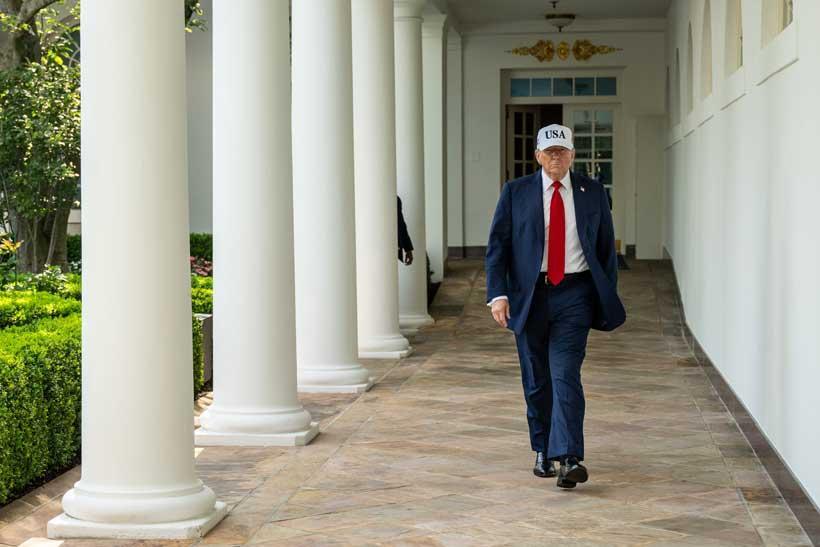By
Brian Hudson
Africa-Press – Mauritius. The world witnessed unprecedented disruption to the post-WWII global order during Donald Trump’s presidency. His “America First” policies, marked by sweeping tariffs, withdrawals from multilateral agreements, and weakening of traditional alliances like NATO, not only challenged U.S. hegemony but exposed deep cracks in global structures, potentially isolating the U.S. more than ever. Richard Haass, President of the Council on Foreign Relations, warns that “America’s greatest strategic advantage over rivals like China and Russia is its network of alliances. Trump’s approach risks squandering that edge” (NPR, 2025).
Yet this moment offers a historic opportunity: the world must move beyond dependency on a hierarchical order dominated by the U.S. toward a horizontal system rooted in equality, non-discrimination, and justice as enshrined in the UN Charter.
The Disintegration of U.S.-Led Order
The post-WWII international order, built around institutions like the UN, NATO, and WTO, was designed to maintain global stability under American leadership. Trump’s presidency deeply undermined this system. His actions amount to a blatant “rejection of the principles of international cooperation reflected in the UN Charter.”
Aggressive tariffs, 25 to 50% on China, have stalled global trade. The WTO forecasts a global trade decline of 8–11% in 2025, with U.S.-China trade shrinking by 81–91% (The Guardian, 2025). These disruptions have crippled supply chains and harmed trade-dependent economies. The withdrawal from key multilateral agreements, including the Paris Climate Accord, the Iran nuclear deal (JCPOA), and the WHO during a pandemic, weakened global responses to shared crises. Threats to withdraw from NATO and pressure on alliance members to increase defense spending have eroded confidence in U.S. commitments, with Europe now seeking greater strategic autonomy, an indicator of U.S. hegemonic decline (Carnegie Endowment, 2025).
Unconditional U.S. backing for Israeli occupation—relocating the embassy to Jerusalem and recognizing the Golan Heights, has violated international law and inflamed global outrage. These double standards have discredited the U.S.-led order, further exposed by its hypocrisy in Ukraine and the earlier abandonment of Afghanistan to the Taliban. M. Steven Fish, political scientist at UC Berkeley, warns, “Trump is reengineering U.S. foreign policy to align with autocracy, inflicting irreparable damage to America’s global standing” (Berkeley News, 2025). The economic data backs this: the IMF projects global growth at 2.8% for 2025, while U.S. growth lags at 1.8%, a sharp drop from earlier forecasts (NY Times, 2025). The Tax Foundation reports that tariffs cost the average American household $1,300 in 2025.
A Hierarchical Order Built on Occupation
The current U.S.-centric global order is inherently unequal, maintained through Western-dominated institutions and coercive tools like sanctions and military interventions. It serves the interests of a few while marginalizing weaker nations. A prime example is U.S. support for Israel’s occupation of Palestine, violating international law and UN resolutions. Amnesty International (2024) classifies Israel’s actions in the occupied territories as apartheid—enabled by American military and financial aid.
Unilateral U.S. sanctions on Iran, Venezuela, and Cuba are another coercive tool. Imposed without UN approval, they hurt civilians and stunt development. A 2023 UN report estimates U.S. sanctions cost Iran over $120 billion since 2018, limiting access to medicine and essentials for millions. NATO, as the military arm of this order, has often served Western geopolitical goals rather than collective security. Its interventions in Libya (2011) and Afghanistan (2001–2021) have led to long-term instability and human suffering. The UN estimates the Afghan war displaced over 2 million people and pushed 40% into extreme poverty (UNHCR, 2023).
The Vision for a Horizontal Order: Principles and Pathways
To escape this unjust order, the world must move toward a horizontal system based on the UN Charter’s spirit, sovereign equality, non-discrimination, and peaceful cooperation. This order must reject U.S. exclusivism, NATO-ism, and occupation-based dominance. Its principles include equality and representation for all nations regardless of economic or military power, genuine multilateralism through inclusive institutions rather than ones controlled by a few, rejection of coercion in favor of diplomacy and dialogue, and a commitment to justice, human rights, sustainable development, and peaceful conflict resolution.
The steps toward a new order include reforming the UN by expanding the Security Council with permanent members from Africa, Asia, and Latin America, and empowering the General Assembly to dilute the dominance of the P5. Strengthening South-South cooperation through blocs like BRICS and the Shanghai Cooperation Organization (SCO) would foster economic and political independence, with BRICS intra-group trade exceeding $6 trillion in 2023 (BRICS Report, 2023). Reforming financial institutions like the IMF and World Bank to give developing countries more decision-making power is crucial, as the U.S. and Europe currently control over 50% of voting rights (World Bank, 2023). Eliminating unilateral sanctions through global consensus, with the UN creating a mechanism to monitor their humanitarian impact, is another vital step.
The German Institute of Development and Sustainability (IDOS) notes that the Global South sees this new era as a chance to break free from Western-dominated structures (IDOS, 2025). Regional cooperation, like China’s Belt and Road Initiative, investing over $1 trillion in infrastructure by 2023, bolsters this shift (BRI Report, 2023).
Peace First, America Last
Trump’s presidency has stripped the mask from an unjust global order upheld by U.S. exclusivism, NATO-ism, and Israeli-style occupation. This system, marked by coercion, double standards, and militarism, can no longer meet the needs of the 21st century. The world now stands at a crossroads. It must seize this disruption to build a new order; one that prioritizes peace, justice, and equality. Reforming global institutions, deepening South-South partnerships, and rejecting coercion can turn “America First” into “Peace and Justice First, America Last.”
This transition will not be easy, but it is essential. As international relations theorist Stephen Walt writes, “Power without legitimacy is not sustainable” (Walt, 2018). Now is the time to act for a fairer world.
moderndiplomacy
For More News And Analysis About Mauritius Follow Africa-Press







